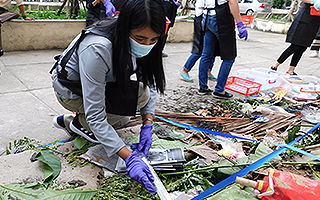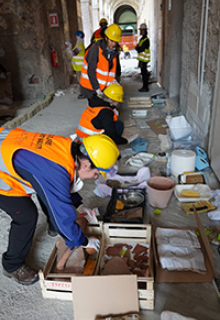Location
- Online Sessions delivered from ICCROM, Rome, Italy
- In-person workshop: Escuela Taller De Filipinas Foundation Inc., Manila, Philippines
Online Sessions
Start date: 7 December 2020
End date: 18 December 2020
In-Person, Hands-On Workshop
Start date: 15 February 2021
End date: 19 February 2021
Post-training projects
Start date: 1 March 2021
End date: 30 May 2021
Organizers
Cooperating Partner:
WHY
Amid the current pandemic, many cultural heritage institutions find themselves vulnerable to the risks of fire, flood, typhoons, earthquakes, and other such hazard events. The threats are however, not just limited to natural hazards, but also include man-made causes like looting, chemical explosions and armed conflicts. Often, heritage professionals are confronted with complex scenarios, where one hazard overlaps with another to create an even larger disaster. Recent examples include the floods in large parts of Asia, which coincided with the COVID-19 outbreak, making it difficult for emergency responders to divert already stretched resources to safeguard heritage collections and sites.
The heritage field therefore needs to shift its focus away from the treatment of individual hazards. Instead, the planning for disaster risk management should be broadened in scope to manage intricate scenarios in which cascading risks could come together to cause substantial damage to heritage, far exceeding institutional capacities to cope. In other words, a multidimensional perspective for reducing the risk of disasters is essential.
WHAT
Moving away from a single hazard treatment approach, this international course offers a unique learning opportunity to protect heritage collections in more complex and real scenarios, with several overlapping hazards, such as an earthquake and fire.
Organized within the ICCROM programme framework of CollAsia and First Aid and Resilience in Times of Crisis, this blended course seeks to develop multi-hazard disaster risk management strategies for cultural heritage collections in Southeast Asia and beyond.
The aim is to broaden the scope of planning for disaster risk management in heritage institutions, and empower movable heritage professionals by enhancing their ability, to reduce the disaster risk for their respective collections in the context of a changing climate, limited resources, and an ongoing public health crisis.
Tailored to the diverse institutional contexts, which may include, but are not limited to libraries, archives, museums, places of worship or community managed cultural heritage centres, this course will combine:
- two-week online learning;
- one week in-person hands-on training in Manila, Philippines; and,
- a three-month post-training project with mentoring support.
At the end of the training, participants will be able to:
- assess risks and develop realistic scenarios to guide risk reduction and preparedness for their respective collections;
- liaise with key disaster risk management actors and stakeholders in their respective local contexts;
- reduce disaster risk and enhance preparedness for heritage collections in and beyond their respective institutions;
- provide coordinated and time sensitive first aid to heritage collections in the event of complex emergencies;
- engage communities in disaster risk management of heritage collections and train volunteers; and,
build local teams of cultural heritage first aiders.
WHERE
The in-person workshop will take place at the Escuela Taller de Filipinas Foundation Inc., in Intramuros, which is the historic walled city of Manila, Philippines. The Escuela Taller de Filipinas is a non-profit organization established in December 2013 to ensure the sustainability of the Escuela Taller Intramuros Programme, which started in 2009 as a collaborative project of the government of Spain and the government of the Philippines, represented respectively by the Agencia Española de Cooperación Internacional para el Desarrollo (AECID) and the National Commission for Culture and the Arts (NCCA). Today, the Escuela Taller de Filipinas is a technical/vocational formation centre, and being the first of its kind in Asia, it aims to rekindle the history of the Philippines through the restoration of significant built structures while at the same time revitalizing its declining traditions in craftsmanship and artisanship through skills development and training of the economically challenged youth.
Since its establishment in 2009, the Escuela Taller has graduated over 700 TESDA-certified industry workers from all over the Philippines and has completed over 20 architectural heritage conservation projects, executed through the satellite trainings and learning-by-doing activities of its trainees and graduates. After the 7.2 magnitude quake in Bohol in 2013, the graduates of the programme actively took part in the rehabilitation efforts within the Santa Cruz Parish Complex in Maribojoc. Moreover, one of the key faculty members of the Escuela Taller De Filipinas Foundation Inc., successfully participated in ICCROM’s immersive 3-week international training on ‘First Aid to Cultural Heritage in Times of Crisis’ in 2018, and will actively contribute to the design of this training program.
HOW
Online illustrated lectures will be combined with videos, virtual group discussions, and practical exercises, to be carried out by participants remotely in their respective institutions. The online learning will be followed by a week-long in-person workshop, during which, participants will learn how to provide coordinated first aid to cultural heritage collections through a series of emergency simulations and table-top exercises.
The learning phase will be followed by a three-month project implementation phase where participants will develop functional and coordinated disaster risk management plans and procedures for their respective institutions. This process will be supported by a group of mentors from ICCROM, ICOM and other partner institutions.
WHO
Participants will be 20 professionals: 16 from the Asia-Pacific Region and 4 from other risk prone regions, who are highly motivated to protect heritage from disasters. Preference will be given to those who are in charge of risk management or emergency planning for a heritage collection, or those who have prior experience of protecting objects or collections during an emergency. During the post-training follow-up, participants will be required to develop functional and coordinated disaster risk management plan for collections in a specific museum, library, archive, gallery, cultural centre or a place of worship. Thus, participants will be selected on the basis of their statements of intent, which must include description of the collection(s) they seek to protect.
SCHOLARSHIPS
A number of scholarships will be available for selected candidates, kindly provided by CHA-Korea for professionals from the Asia-Pacific region, and by ICCROM for professionals from other regions. Priority will be given to selected candidates from ICCROM Member States. Scholarships will cover round-trip travel, accommodation and meals in Manila during the in-person workshop.
TO APPLY
Please use the online course application form.
Please note that your personal statement is a fundamental requirement. You are expected to write approximately 650 words on:
- the collection(s) that you would like to safeguard from disasters;
- description of the risks to these collection(s); and,
- how your role or position within your institution would enable you to improve disaster risk management for the collection(s) you have identified.
In order to finalize your application, the following digital files will be required when completing the online form:
- Portrait photo (allowed formats: gif jpg jpeg png tif tiff with a maximum file size of 3 MB)
- Official endorsement (allowed formats: pdf doc docx jpg jpeg png tif tiff with a maximum file size of 5 MB)
For further information, please contact: collasia@iccrom.org
If you are part of an ICOM member institution and are interested in being part of this programme, please contact training@icom.museum.
How can you save cultural heritage in an emergency?



